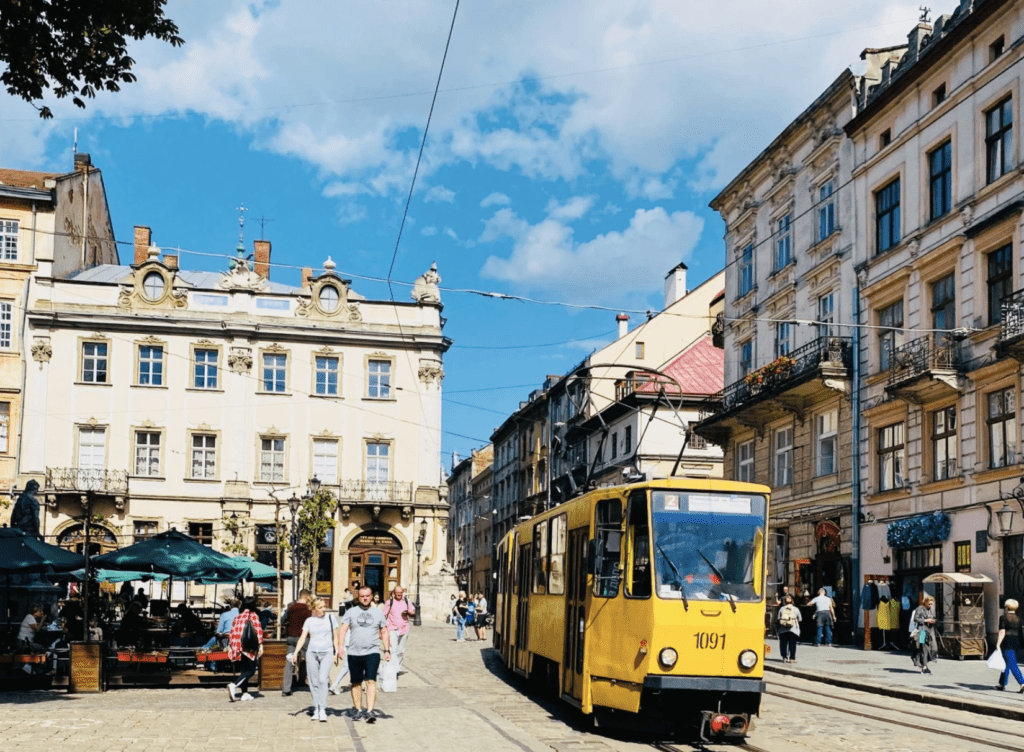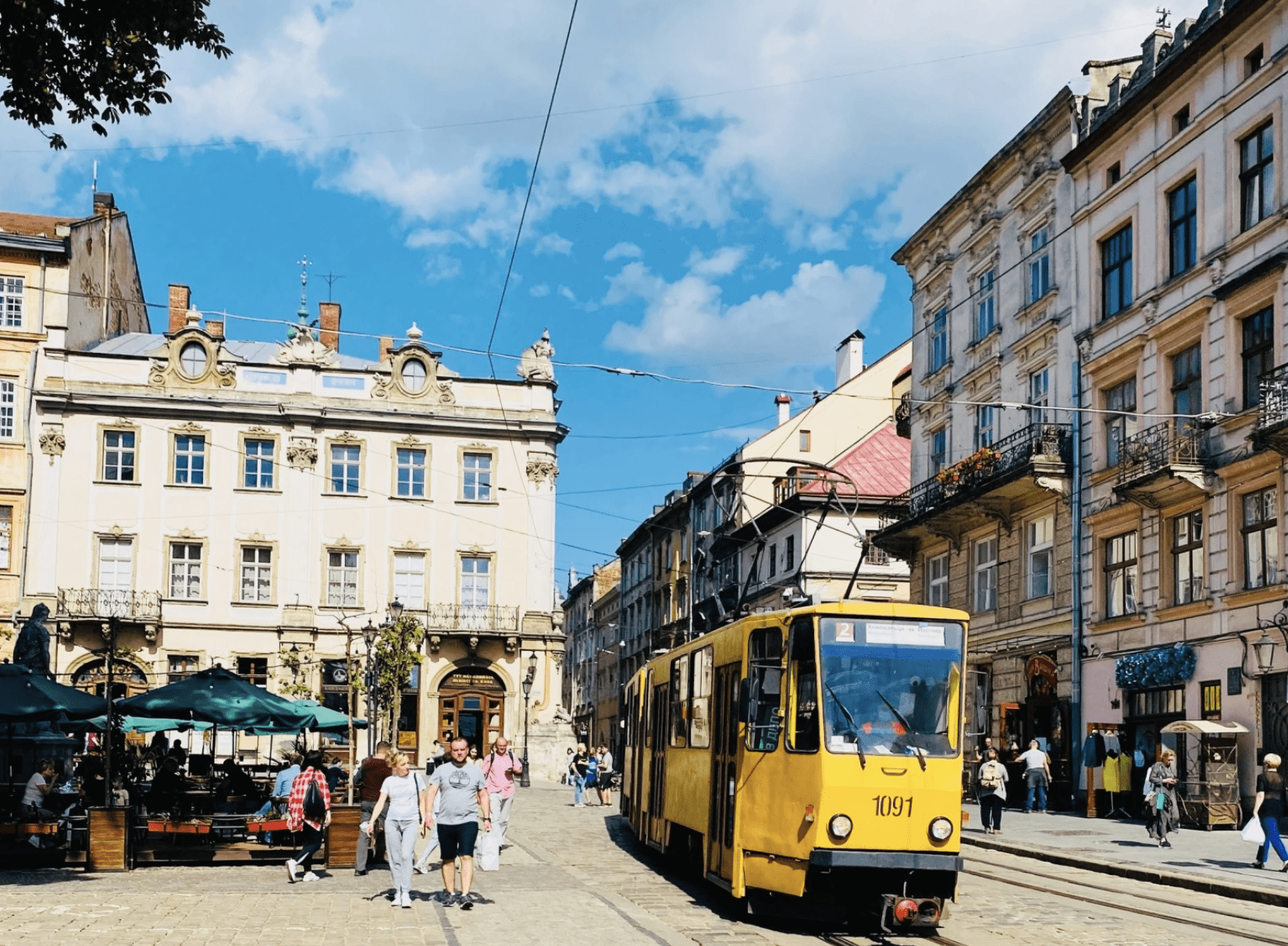The heart of Russia is not inside the Kremlin, writes Alya Michelson. Many Russians have roots in both Russia and Ukraine, speak both languages and embrace the deep cultural heritage of both countries.

By Alya Michelson
The road trips to Lviv from the suburban Ukrainian village where I lived as a child were always a favorite. My mother and I made frequent visits there because she worked in the city’s library.
As a five-year-old girl, I remember walking through the historic neighborhoods paved with centuries-old dark oval cobblestones that, my mother reminded me, were strong enough to withstand any force. Through revolutions, occupations, and multiple wars, the cobblestones remained intact.
Today, thousands of refugees are passing through Lviv to escape Vladimir Putin’s war on their homeland. Somewhere on our route, along those same cobblestone streets, volunteers filled sandbags and installed concrete blocks to protect this beautiful city from uninvited troops.
My roots are in both Russia and Ukraine. I speak Ukrainian and Russian and embrace the cultural heritage of both countries.
I spent much of my childhood in Ukraine and still have relatives there. I later studied and worked as a journalist in my native Russia before immigrating to California more than a decade ago. My ancestors are from both sides of the conflict zone, and the two countries are equally close to my heart. For me, we belong to a big Slavic family—distinct from one another but coexisting in peace.
We must stop hate before it is too late—before more Ukrainian and Russian women are burying sons, brothers, and husbands, and our children live with the scars of war for generations.
I am now an American citizen raising my family in Los Angeles—6,300 miles removed from the streets of Kyiv, where the battle for control of the nation rages.
I watch the unfolding conflict with pain and disbelief. Call it an “invasion” (as Ukraine President Volodymyr Zelenskyy rightly puts it) or “operation” (in the words of Russian President Vladimir Putin); people are dying while leaders solve problems with the bodies of their citizens.
“Again war. Again sufferings, necessary to nobody, utterly uncalled for,” Leo Tolstoy famously wrote during the Russo-Japanese War more than a century ago. But I am not just echoing the lessons of history from a great author.
I am also speaking out on behalf of my young daughter. She worries that her schoolmates will bully her and other Russian Americans because of the war. Her fear is not baseless—anti-Russian American sentiments are spreading on social media, and a Washington, D.C., restaurant named Russia House was vandalized in the aftermath of the invasion.
Hate feeds war. The history of American immigration is full of hostility toward different nationalities in response to world conflicts. One need only remember the Japanese-American internment camps in California and other western states during World War II.
Slavic Americans are among the single largest ethnic groups in the country, and nearly 3 million Americans have Russian ancestry. Even so, I see countless calls to boycott anything Russian while the Kremlin’s propaganda machine perpetuates the myth that all Russian people want the war. All Russians I know feel crushed and helpless because there is little we can do, and still, we bear the responsibility of this war.
Still, within hours of Putin’s attack, thousands of Russian protesters poured into the streets, shouting “Net voine” (“No to war”). Those same words were splashed with paint on the glass doors of the Russian State Duma, the parliament that had almost unanimously supported the invasion. These anti-war demonstrations continue in the face of violent police actions against them.
Protests in Russia by Russians continue, shattering the facade that Putin speaks for all.
Prominent Russians wrote open letters and petitions to the government. They flooded social media with messages that Russia is not Putin and Russians are not murderers.
And so the crackdown on freedom of expression continues. Using the threat of fines, arrests, and the blocking of internet services, Russian authorities are pushing social media companies to censor unfavorable material online while keeping pro-Kremlin media unfiltered.
Free speech on Facebook, Twitter, and Instagram was already heavily restricted, yet my friends in Moscow risk their safety by exercising their right to express their opinion and disagreement. In Russia, one cannot call the country’s military operation an “invasion” without being marked by the government as a “foreign agent.”
As a former journalist, I know that every story about conflict needs a villain, but let’s be clear: The heart of Russia is not inside the Kremlin.
Now there are widespread reports that even the Russian soldiers are reluctant to fight Putin’s war, with videos of soldiers surrendering without a fight and ditching their tanks and trucks.
As a former journalist, I know that every story about conflict needs a villain, but let’s be clear: The heart of Russia is not inside the Kremlin. It lives in the beautiful music and vast natural beauty of Siberia; in my mom’s hug and the crisp sound of church bells on Easter morning. I am in awe of the courage of those in Russia speaking out against the war, just as I marvel at the glorious bravery of the Ukrainian people fighting for their nation.
Just as my American daughter, born in Moscow, bears no responsibility for the imperial hunger of one man, let’s not demonize an entire citizenry for the sins of their leader.
Let’s not be fooled. Every war in the history of humanity ends, even the Hundred Years’ War. Leaders sign peace treaties and move on, but those who suffer and allow themselves to remain angry will have this anger forever.
We must stop hate before it is too late—before more Ukrainian and Russian women are burying sons, brothers, and husbands, and our children live with the scars of war for generations.
Alya Michelson, a former news correspondent for Ria Novosti in Moscow, is co-chair of Michelson Philanthropies in Los Angeles. She supports and recommends relief agencies helping those suffering in Ukraine: https://linktr.ee/alya.michelson.
This article was originally published by Thrive Global.

